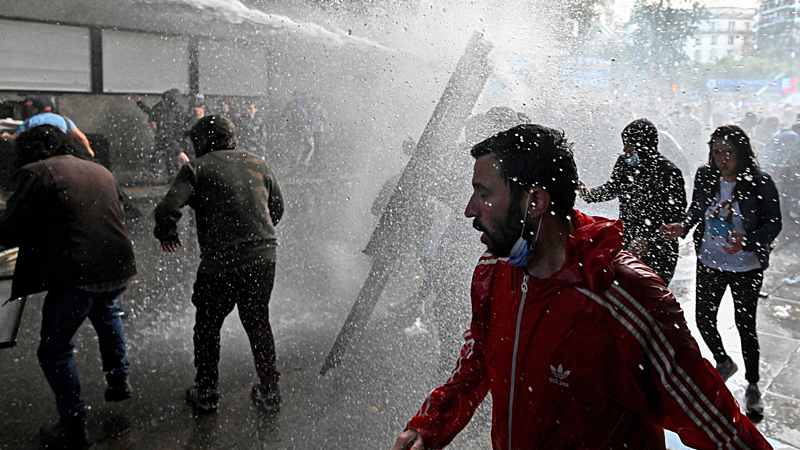In Argentina, this past weekend was marked by escalating police repression against supporters of Vice President Cristina Fernández de Kirchner (CFK). Since an Argentine prosecutor ordered a 12-year prison sentence against CFK on August 22, hundreds of supporters have held a vigil around the building where Cristina resides in Buenos Aires.
On August 26, the city’s mayor, Horacio Rodríguez Larreta, of the opposition party Republican Proposal (PRO), decided to send the Buenos Aires police to the vigil to surround the blocks around the building with tarpaulins. The mayor claimed that there had been complaints from neighbors, who were irritated with demonstrations since the beginning of the week. The wealthy Recoleta area where CFK lives represents an important niche of the PRO electorate. The barrier prevented the arrival of new demonstrators at the site.
Tensions began when a group of people pushed barriers to clear the way. The police advanced with tear gas and hydrant trucks on the demonstrators. Vehicles were attacked, and the officers escalated the onslaught, and injured a journalist.
The incident resulted in arrests, including those of Peronist legislators. Later, with barriers already removed, police attacked and insulted CFK’s son, Máximo Kirchner, in order to prevent him from entering the building.
Interior Minister Eduardo “Wado” de Pedro shared the video of the confrontation on his social network. “Very serious. Yesterday, when there were no longer any barriers, a group of city police officers prevented deputy Máximo Kirchner from entering his mother’s residence, being beaten and insulted. Behind the false republicanism, they hide a deep authoritarianism and contempt for democracy,” wrote the minister.
The Peronist governor of Buenos Aires, Axel Kicillof (Frente de Todos), classified the act as “mafia violence.”
“They were following orders from Larreta who, in turn, is following orders from [Mauricio] Macri,” he wrote.
Negotiations
Before 11 pm, Cristina Kirchner came out to speak to the protesters on a makeshift stage. “We have to ask the opposition, especially now that a new presidential campaign is approaching, to stop competing among themselves for who hates and attacks the Peronists the most,” she said. “Let’s rest, because it’s been a long day.”
The strategy of seeking to isolate and intimidate the vice-president and her supporters ended up having an unexpected effect. In addition to the continued mobilization and broad support for the vice president, the repressive advance prompted a negotiation between the ruling coalition and opponents of the Republican Proposal. After a meeting between security authorities, the mayor finally agreed to remove the barriers and to allow the mobilizations to continue outside CFK’s building, but at agreed times and without encampments and fireworks.
The episode of CFK’s house isolation and police repression has come to be compared to October 17, 1945, when a massive mobilization forced the release of Juan Domínguez Perón, detained on the island of Martín García. An inaugural figure of the Peronist movement in the country, the then vice-president was persecuted by the military for promoting workers’ rights.
The incident also prompted a public appearance by CFK, who had already published a letter to Horacio Larreta, entitled “Mr. Larreta’s Tapes”. In the missive, she denounced the actions of the security apparatus. The vice president recalled previous episodes in which militants and supporters of Argentine President Mauricio Macri set up in the same place, in front of her house, with sound equipment emitting hate messages and even death threats.
“In all those years, Mr. Larreta’s police never intervened. More than that: they cultivated and guaranteed these attitudes,” Kirchner wrote. In the conclusion of the letter, she made reference to the judicial persecution that prompted the vigil.
“The logic of Mr. Larreta is the same logic of the judicial party. For the Macrists (the response is): care and protection. For the Peronists (the response is): barriers, the infantry of the city police and even pieces of wood, tear gas and pepper spray, as on Monday night. As I said that night: they never have been and never will be democratic.”
Among the PRO itself, there are disagreements about the effectiveness of Larreta’s strategy. Patricia Bullrich, president of the party and leader of the “hard wing” of the Macrists, said in a television interview that the Buenos Aires government is “weak” for allowing the city streets be “always taken over” by demonstrations. Another perception is that Larreta is investing in a firmer image to confront former president Mauricio Macri as a candidate for the 2023 presidential elections.
This article was written by Fernanda Paixão and originally published on Brasil de Fato.





